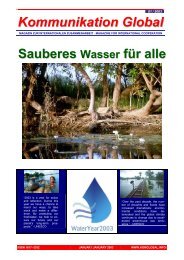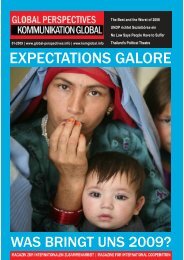GLOBAL PERSPECTIVES | Second Quarterly 2013 â North America ...
GLOBAL PERSPECTIVES | Second Quarterly 2013 â North America ...
GLOBAL PERSPECTIVES | Second Quarterly 2013 â North America ...
You also want an ePaper? Increase the reach of your titles
YUMPU automatically turns print PDFs into web optimized ePapers that Google loves.
<strong>GLOBAL</strong> <strong>PERSPECTIVES</strong> - SECOND QUARTERLY <strong>2013</strong><br />
2007 bank run on <strong>North</strong>ern Rock, a UK bank | Credit: Wikimedia Commons<br />
Central bankers from the entire world join in the Bank for<br />
International Settlements (BIS) based in Basel. Now its<br />
Basel Committee on Banking Supervision, headed by the<br />
governor of the Swedish Central Bank, Stefan Ingves, has<br />
come up with a proposal that would finally subject European<br />
banks to a relationship between their capital and the<br />
volume of financial operations they can afford.<br />
‘Revolutionary’ proposal<br />
This ‘revolutionary’ proposal calls a relationship of 3 percent,<br />
meaning that the banks would need to hold about 1<br />
euro in capital for every 33 euro in risk or other financial<br />
exposures. Obviously, of course, if a bank sustains a loss<br />
higher than 3%, it would require the state to eliminate the<br />
deficit in order to save the institution. Well, even this bland<br />
proposal has been received with a howl of protest from<br />
many banks, claiming that they would have great difficulty<br />
in raising capital.<br />
Under the old capitalist economy, no enterprise would run<br />
without capital adequate to its need. Today we have a new<br />
branch of economy, which wants to play without capital,<br />
and expects the state to bail it out if anything goes wrong.<br />
So, let us just look briefly at how many times things went<br />
wrong without anybody ever going to jail.<br />
On April 28, 2002, then New York State Attorney General<br />
Eliot Spitzer, on behalf of the U.S. Securities and Exchange<br />
Commission (SEC), won a lawsuit ordering 10 U.S. banks to<br />
pay 1.4 billion dollars in compensation and fines because of<br />
fraudulent activities. One year later, the SEC discovered<br />
that 13 out of 15 financial institutions randomly investigated<br />
were guilty of fraud. In 2010, Goldman Sachs agreed to a<br />
fine of 550 million dollars to avoid a trial for fraud. In July<br />
last year, the U.S. Senate presented a 335-page report on<br />
the British bank HSBC, the largest in Europe.<br />
Over the years it helped drug dealers and criminals recycle<br />
illicit money. For example, the bank sent 60 billion dollars<br />
in cash by road or plane from the accounts of Mexican drug<br />
dealers to its New York Branch. The fine was 1.9 billion<br />
dollars. In November 2012, SAC Capital was fined 600 million<br />
dollars, and in the same month the second British<br />
bank, Standard Chartered, was fined 667 million dollars. In<br />
February this year, Barclays Bank announced that it had<br />
set aside 1.165 billion euro to face fines for “illicit transactions”<br />
(the bank is now under investigation for a very dubious<br />
capital increase of 8.4 billion euro in 2008).<br />
And in March this year, Citigroup accepted a fine of 730<br />
million dollars for “selling investments based on junk to<br />
unsuspecting clients”. These are just a few of the most<br />
clamorous cases, and there are many, many more, involving<br />
even the Japanese bank Nomura.<br />
We all know that the crisis in which we find ourselves<br />
(which, for the optimists, will end in 2020 and for the pessimists<br />
in 2025) was triggered in the United States by the<br />
10 largest banks which decided to sell derivatives based on<br />
junk and certified by the Standard & Poor’s and Moody’s<br />
rating agencies. U.S. taxpayers “donated” 750,000 million<br />
dollars to the banks, while the British did the same for<br />
HSBC, Royal Bank of Scotland, Barclays Bank and <strong>North</strong>ern<br />
Rock.<br />
While this financial disaster was happening, the ‘Big Five’<br />
(Goldman Sachs, Merrill Lynch, Morgan Stanley, Lehman<br />
Brothers and Bearn Sterns) paid their executives 3 billion<br />
dollars between 2003 and 2007, And, in 2008, they received<br />
20 billion dollars in bonuses while their banks were<br />
losing 42 billion dollars.<br />
All of this was certified by Standard & Poor’s and Moody’s,<br />
which control 75% of the world market. Now Standard &<br />
Poor’s has been requested to pay 500 million dollars. But<br />
what about the millions of people who have lost their jobs?<br />
The millions of young people who see no future in their<br />
lives? It’s the old story: if you steal bread, you go to jail, but<br />
if you steal millions, nothing will happen to you … and if<br />
you steal millions in a bank, even less reason to worry.<br />
Meanwhile, back at the summit table, the priority for survival<br />
is to allocate taxpayers’ money, even if all talk about<br />
youth unemployment. After all, what really matters is that<br />
leaders will be re-elected. [IDN | July 6, <strong>2013</strong>] <br />
- 9 -















